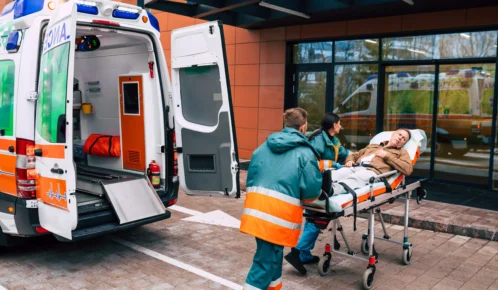What evidence is crucial in a truck accident lawsuit? There are several key pieces of evidence you will need to succeed with a truck accident lawsuit, including medical records, police reports, witness statements, and photographic evidence, among others. Gathering and organizing this evidence could help you prove the nature of your injuries and the accident, potentially helping you recover compensation from negligent truck drivers or other parties.
Table of Contents

To find out whether you have a valid truck accident case, call Ankin Law at 312-600-0000 for a free initial consultation with a truck accident attorney.
Types of Evidence in a Truck Accident Lawsuit
To prove negligence in a truck accident lawsuit and the extent of your injuries, you will need sufficient evidence to back your case. There are plenty of pieces of evidence that could support an Illinois truck accident case, including:
Medical Records
If you sustained any injuries after a truck accident, you should receive immediate medical treatment to begin generating medical records. These records will help prove the extent of your injury and help connect it to the accident.
Police Reports
If the truck accident warranted contacting the police, you should be able to access a police report that details the nature of the accident. This document may prove your version of events and show that another party’s negligence directly caused the accident.
Witness Statements
If any witnesses were present at the time of the accident, try to get their contact information to obtain potential statements. The police may also record official statements from witnesses that you can use in a case.
Photos and Video Footage
Another crucial piece of evidence is visual, taking the form of either photos or videos. This media could capture injuries along with the scene of the accident. For example, you could take photos of your injuries, vehicle damage, and other property damage following the accident. Meanwhile, nearby CCTV footage at the accident scene may have recorded the accident itself, potentially showing how the accident occurred.
Event Data Recorders
If the accident involved a commercial truck or another commercial vehicle, you may be able to use evidence from the vehicle’s event data recorder (EDR), i.e., black box. These devices record various types of operational data that could potentially show how an accident occurred, such as details about the vehicle’s speed at the time of the accident.
Driver Logs
Commercial truck drivers must also maintain driver logs in most cases, with laws in place dictating how many hours a truck driver can drive. Logs keep track of the number of hours the driver has operated the vehicle and the distance driven during those periods. If truck drivers work longer hours than they’re legally permitted to, they could suffer from fatigue, increasing the risk of an accident.
Maintenance Documents
Truck accidents may also result from mechanical issues, which could be a trucking company’s or a mechanic’s fault. Company records might show that a trucking company failed to have its vehicle serviced regularly, or they might indicate that a mechanic failed to properly check for or address certain issues.
Challenges in Obtaining Evidence
In some cases, you might struggle to get a hold of the evidence needed to support your case. For instance, you might not be able to obtain a copy of a police report, which could hinder your ability to prove your version of events after the accident.
If you are unable to obtain key pieces of evidence, it could reduce the amount of compensation you’re able to recover or compromise your case entirely. Because of the need for valuable evidence, you should consult with an experienced truck accident lawyer to help you obtain any evidence you’re unable to get on your own.
What Factors Impact the Admissibility of Evidence?
There are a couple of key factors that can affect the admissibility of evidence in a truck accident case. These include:
The Quality of Evidence
If evidence has degraded enough or simply isn’t substantive enough to support your case, you may not be able to use it. For example, photos or video footage may not clearly show injuries, damage, or the accident. Witness statements could also be unclear, inconclusive, or inconsistent, failing to paint a clear picture of the accident.
The Statute of Limitations
Like other civil cases, truck accident lawsuits have a specific statute of limitations in place. This statute gives plaintiffs a limited amount of time to file a lawsuit before they’re unable to seek compensation.
In Illinois, the statute of limitations for truck accidents is two years from the time of the accident or the discovery of injuries. In other words, you will have two years to file a lawsuit after an accident before evidence is inadmissible, and you can no longer seek compensation from negligent parties.
However, there are some exceptions to the statute of limitations that might apply to your case. An example of this is if you were a minor at the time of the accident. Minors can wait until they turn 18 to file a lawsuit, at which point the statute of limitations will begin. Also, the statute of limitations may not begin right away if the liable party is currently in another state.
Steps to Take After a Truck Accident
Truck accidents frequently occur in Illinois. In one recent year, tractor-trailers alone accounted for 3.8% of accidents and 3% of accidents resulting in injuries. Many of these accidents warrant a lawsuit against negligent parties that caused them, such as truck drivers, trucking companies, and others.
To get the most from your evidence and maximize your chances of succeeding with a truck accident lawsuit, you should know what to do after a truck accident.
The following are the primary steps to take following an accident:
Check for Injuries and Move to a Safe Area
Immediately after an accident, it’s important to stay calm and check to see if anyone is injured. If anyone has sustained injuries in the vehicle, stay in place until emergency personnel arrive. If needed, medical professionals may transport victims to a hospital in an ambulance.
If possible, move your vehicle to a safe area away from traffic.
Contact the Police
Someone at the accident scene will need to call the police if the truck accident resulted in injuries or extensive property damage. When law enforcement officials arrive at the scene, they can begin drafting a police report, which could provide you with evidence in a lawsuit later. The police will record statements from individuals involved, including drivers, pedestrians, and nearby witnesses.
Collect Information from All Parties Involved
You must also collect relevant information from drivers and others directly involved in the accident. These details will include:
- Names
- Addresses
- Phone numbers
- License plate numbers
- License numbers
- Insurance information
Recording this information could help you build a case and begin the insurance claims process.
Seek Medical Attention
Another crucial step involved in a truck accident lawsuit will involve getting professional medical attention. Even if you have minor symptoms and your injuries don’t appear to be serious, they could develop into a more serious condition later. Also, the longer you wait to receive treatment, the more difficult it will be to prove that the accident caused your injuries.
Not only will seeking medical care put you on the road to medical recovery, but it will also provide you with invaluable medical records that could clearly indicate the nature of your injuries in an accident case.
Consult an Attorney
Before filing a claim or lawsuit, speak with an experienced Chicago truck accident attorney. A lawyer with a focus on truck accidents may be able to represent you during the claims process or file a lawsuit if needed.
During a free consultation, an attorney will evaluate your case, including any supporting documentation you were able to recover following the accident. He or she may then decide to represent you.
A good attorney will have a deep understanding of how car insurance companies investigate accident claims, helping you navigate the claims process. In doing so, he or she could identify and calculate all the damages associated with your case, factoring them into a final settlement.
For example, an attorney could determine that you qualify to recover economic damages like medical bills, lost income, lost earning capacity, and other financial losses, along with non-economic damages like pain and suffering.
If you’re unable to obtain the evidence needed to build your case, this is another area where an attorney can help. He or she could contact medical professionals, law enforcement agencies, trucking companies, and other parties to get critical documentation to help build your case. In addition, he or she may be able to represent you in a trial case if a claim doesn’t result in a settlement. Having evidence like medical records, police reports, and footage of the accident will go a long way in helping you develop a solid case. For help with a claim or lawsuit, contact us at Ankin Law today.



